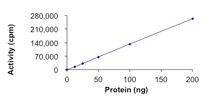
FGFR2 (K526E), Active(F05-12BG)
FOR BULK ORDER REQUESTS PLEASE CONTACT US
Description :Recombinant human FGFR2 (K526E) (285-end) was expressed by baculovirus in Sf9 cells using an N-terminal GST tag.
Species :Human
Tag :GST tag
Expression System:Sf9 insect cells using baculovirus
Sequence :285-end (K526E)
Genbank Number :BC039243
Specific Activity :Sample Kinase Activity Plot. For specific information on a given lot, see related technical data sheet.
Purity :Sample Purity Data. For specific information on a given lot, see related technical data sheet.
Storage, Stability and Shipping :Store product at –70oC. For optimal storage, aliquot target into smaller quantities after centrifugation and store at recommended temperature. For most favorable performance, avoid repeated handling and multiple freeze/thaw cycles.
Applications :Kinase Assay
Molecular Weight :~72 kDa
Gene Aliases :K-SAM, BFR-1, CEK3, ECT1, TK14, TK25, CD332, JWS, TK14
Scientific Background :FGFR2 is a member of the fibroblast growth factor receptor family which play a role in mitogenesis and differentiation. FGFR2 is a high-affinity receptor for acidic, basic and/or keratinocyte growth factor, and mutations in FGFR2 are associated with Crouzon syndrome, Pfeiffer syndrome, Craniosynostosis, Apert syndrome, Jackson-Weiss syndrome, Saethre-Chotzen syndrome, and syndromic craniosynostosis (1). FGFR2 is required for early postimplantation development between implantation and the formation of the egg cylinder (2). FGFR2 contributes to the outgrowth, differentiation, and maintenance of the inner cell mass.
References :
1. Arman, E.; : Targeted disruption of fibroblast growth factor (FGF) receptor 2 suggests a role for FGF signaling in pregastrulation mammalian development. Proc. Nat. Acad. Sci. 95: 5082-5087, 1998.
2. Genomic screening of fibroblast growth-factor receptor 2 reveals a wide spectrum of mutations in patients with syndromic craniosynostosis. Am. J. Hum. Genet. 70: 472-486, 2002.
Product Sheets (By Lot #) :
Research Areas :AKT/PKB Pathway, Angiogenesis, Cancer, ERK/MAPK Pathway, Receptor Tyrosine Kinases, Cancer, AKT/PKB Pathway, ERK/MAPK Pathway, Angiogenesis, Receptor Tyrosine Kinases
